Lorain’s Records Commission Had an 8-Month Gap in Meetings
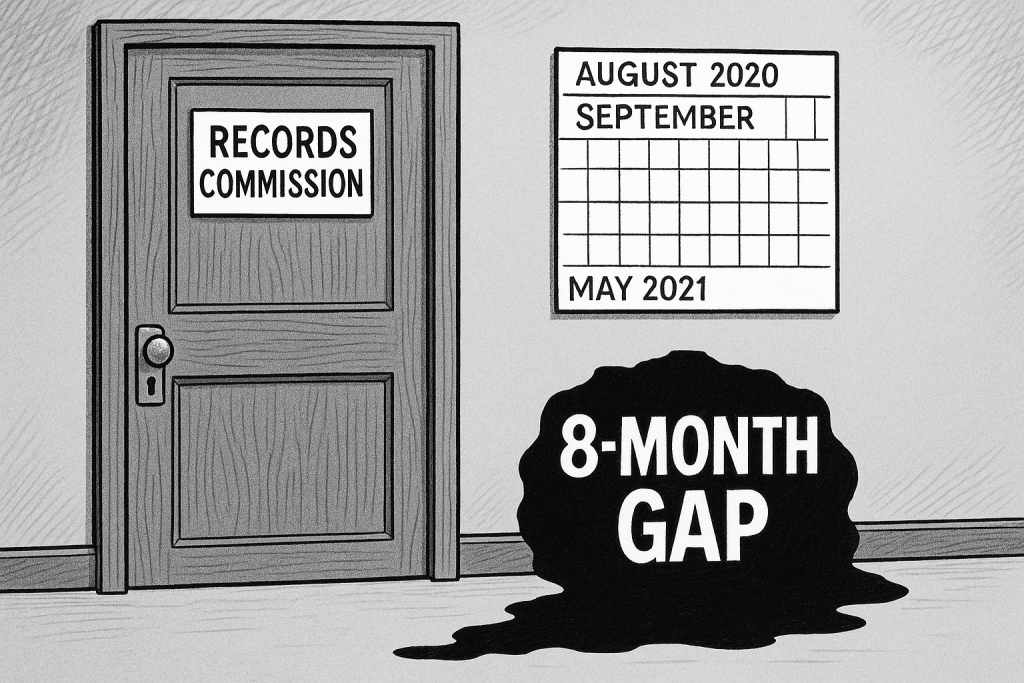
By Aaron Knapp | Lorain Politics Unplugged
Aug 05, 2025
When city officials criticized my July 2025 report on the Lorain Records Commission’s inactivity, they failed to acknowledge a far more serious breach—one documented in their own archives. Between August 25, 2020, and May 10, 2021, the Records Commission failed to hold any meetings at all. That gap exceeded the six-month requirement imposed by Ohio law.
Why This Matters to You
This might sound like a bureaucratic technicality, but it’s not.
Thanks for reading Aaron’s Substack! Subscribe for free to receive new posts and support my work.
Every time a record is lost or destroyed without oversight, it could be your record. It could be the body cam footage you need to prove misconduct. The grant application for your neighborhood. The billing error on your utilities. Or the document that could exonerate you—or someone you love—from a false accusation.
When oversight breaks down, it doesn’t just harm reporters or watchdogs. It hurts every resident who depends on a paper trail to hold government accountable.
Transparency isn’t a luxury. It’s a safeguard. And when that system fails, we all pay the price.
What the Law Says: ORC §149.39
Under Ohio Revised Code §149.39, each municipal records commission:
“…shall meet at least once every six months and upon the call of the chairperson.”
The law isn’t a suggestion—it’s a mandate. The Records Commission plays a vital role in authorizing records retention schedules and approving disposal of obsolete documents. These responsibilities ensure that no record—be it emails, council minutes, disciplinary files, or grant documentation—is unlawfully discarded or mishandled.
When the Records Commission fails to meet as required, several legal and practical risks emerge:
- Unlawful destruction of records that should have been preserved for audits, litigation, or public access.
- Administrative actions taken without proper retention oversight, which may invalidate policies or resolutions.
- Loss of evidentiary material tied to investigations, civil complaints, or fiscal audits.
In short, failure to convene undermines not only the integrity of recordkeeping but also the legal infrastructure that supports transparency and government accountability. When a city government sidesteps this responsibility, it isn’t just a bureaucratic lapse—it’s a breakdown in lawful governance.
Verified Public Gap: August 2020 – May 2021
A review of the city’s own public meeting portal shows that while multiple government bodies met throughout late 2020—Board of Control, Demolition Board of Appeals, and Planning Commission, among others—no Records Commission meeting appears on the agenda list for August 2020 through May 2021.
This 8-month absence wasn’t buried in a backlog, it was clear and visible in the city’s official documentation. If such a meeting did occur, then the city failed to meet not just one, but multiple legal obligations:
- No public notice was posted, in violation of ORC §121.22(C), which requires all public bodies to give at least 24 hours’ notice of meetings.
- No meeting minutes were published or retained, contrary to ORC §121.22(G) and public records retention rules.
- No agenda was made available, a violation of best practices for public governance and a common-sense transparency principle.
This wasn’t a one-time clerical oversight. It was a systemic failure of governance and documentation. In a city where public records are already under scrutiny for delayed release, selective disclosure, and inconsistent meeting practices, this prolonged absence deepens the credibility crisis. It also raises serious questions: What records were approved for destruction during that time? Who authorized them? And why was the oversight process silent?
Public accountability doesn’t work on the honor system—it requires documentation, process, and legal compliance. And during that 2020–2021 gap, Lorain’s Records Commission failed all three.
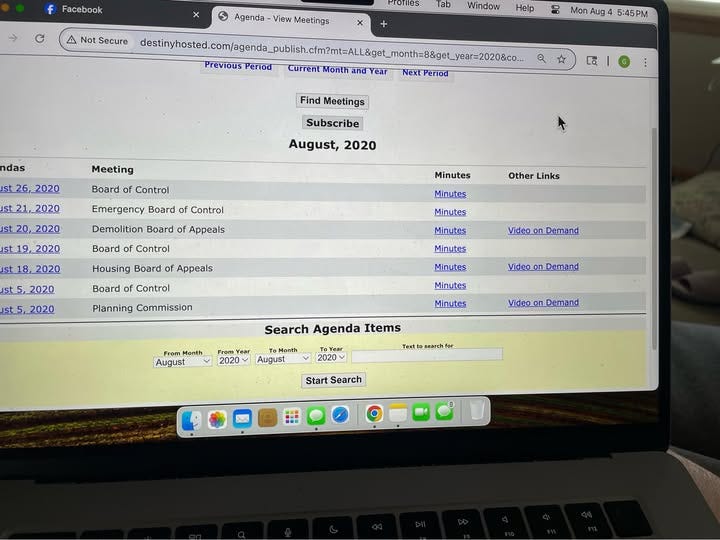
The Mayor’s Deflection
At the August 1, 2025 Records Commission meeting, Mayor Jack Bradley attempted to discredit my reporting by stating:
“Journalists can be sued if they make the wrong claim.”
He further suggested that residents shouldn’t rely on investigative articles or public notices, but instead should simply “ask” or “call” city hall for information.
This approach is both legally and ethically flawed. Sunshine Laws don’t operate on a ‘just call us’ basis. They require proactive public posting of meeting notices and timely publication of minutes under ORC §149.39 and §121.22. The right to public records is statutory—not conditional upon who you know or whether you’re willing to call a government office during business hours.
More importantly, Bradley’s own remarks may expose him to legal liability. Federal courts have consistently ruled that when public officials threaten legal action in response to constitutionally protected speech, such threats may constitute retaliation under 42 U.S.C. §1983. When the goal is to discourage criticism or suppress reporting, that behavior is not just wrong—it’s potentially unlawful.
His comment was more than bluster. It was a veiled warning—what legal scholars call a SLAPP: Strategic Lawsuit Against Public Participation. Thanks to the recent passage of Ohio’s anti-SLAPP law—Senate Bill 138, which took effect April 3, 2025—journalists and citizen watchdogs now enjoy added protection against retaliatory lawsuits. Mayor Bradley’s threat isn’t just unconstitutional under the First Amendment—it may now also violate Ohio statute. The threat of a lawsuit, used by a sitting mayor to intimidate a journalist, only proves the necessity of that journalist’s work.
Mayor Bradley should also be aware: false statements made by public officials about private citizens—especially those that imply criminal conduct or professional dishonesty—can give rise to defamation claims against him. The law protects truthful reporting and public interest commentary—not political leaders who lash out at those holding them accountable.
The City’s Delayed Excuse
In 2025, city staff claimed that the Records Commission did meet on January 30, 2025—but did not approve or release minutes until August. They stated this delay was due to the commission’s internal practice of only approving minutes at the next semiannual meeting.
But this practice is not required by law. Nothing in ORC §121.22 prohibits publishing draft or unapproved minutes, which many other public bodies across Ohio routinely do. In fact, doing so would promote clarity and public trust.
By withholding the existence of this meeting for over six months, the city only deepened public confusion—and gave the appearance of concealment. Timely publication of draft minutes could have resolved the issue before it became a controversy. Instead, the city chose delay over transparency.
A Pattern of Delay and Obstruction
The January 2025 meeting minutes were not released until August 2025, and only after sustained public pressure and repeated records requests.
When citizens inquired about the meeting schedule, some emails were ignored or redirected to other officials without answers. Meanwhile, public meeting notices were inconsistently posted, sometimes failing to meet 24-hour notice requirements under ORC §121.22(F).
This isn’t simply a bureaucratic error—it reflects a deeper pattern:
- The Records Commission failed to meet its six-month duty.
- Minutes were withheld until public criticism escalated.
- Emails seeking clarity were disregarded.
- Citizens were told they should have “called” instead of relying on the public record.
This sequence of events doesn’t indicate mere disorganization. It points to systemic opacity.
When legal compliance becomes optional and transparency becomes adversarial, the public loses faith—not only in individual officials, but in the entire process.
Final Thought: When the Watchdogs Go Silent
This article isn’t about clerical mistakes or gotcha journalism. It’s about the people of Lorain and their right to know how their government is handling public information. When oversight boards like the Records Commission go quiet, the public loses a vital safeguard against mismanagement, erasure of history, and abuse of power.
City officials may criticize the timing or tone of my reporting—but those concerns should never override the public’s right to know. If the mayor or commission members believe they’ve been unfairly represented, the remedy isn’t censorship or litigation threats. It’s transparency, documentation, and lawful compliance.
When my original July 2025 article raised questions about a potential year-long gap in meetings, it was based on the available record—and it included a clear legal disclaimer inviting readers to verify for themselves. That disclaimer applied then and it applies now.
Indeed, the very issue Mayor Jack Bradley addressed—unreleased January 2025 meeting minutes—only proves the point. Had the city released those minutes in a timely manner, the public wouldn’t have had to speculate. Had they posted a notice of the meeting, reporters wouldn’t have had to dig. This burden was created by city hall, not by citizens asking questions.
And while that earlier article focused on a more recent lapse, this one documents a verified, eight-month violation that no one can deny.
The goal of this work has never been to embarrass anyone—it’s to ensure the law is followed, the truth is recorded, and the public remains informed. When public records vanish or oversight collapses, the entire community suffers—not just reporters.
Legal Disclosure
This article is based on official meeting minutes obtained through a public records request and reviewed for accuracy as of August 2025. The conclusions expressed reflect both verified documentation and protected opinion commentary under the First Amendment. Any omissions in the city’s public posting or record-keeping are the responsibility of those in office. All citizens are encouraged to request their own copies and challenge denials through the Ohio Court of Claims or Attorney General’s Public Records Unit.



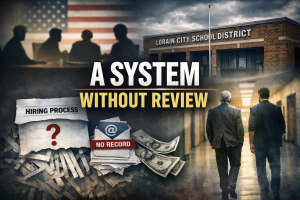

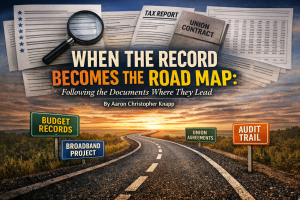
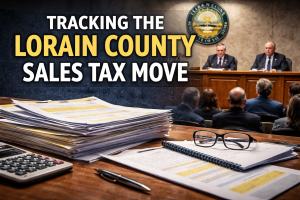
1 thought on “Lorain’s Records Commission Had an 8-Month Gap in Meetings”